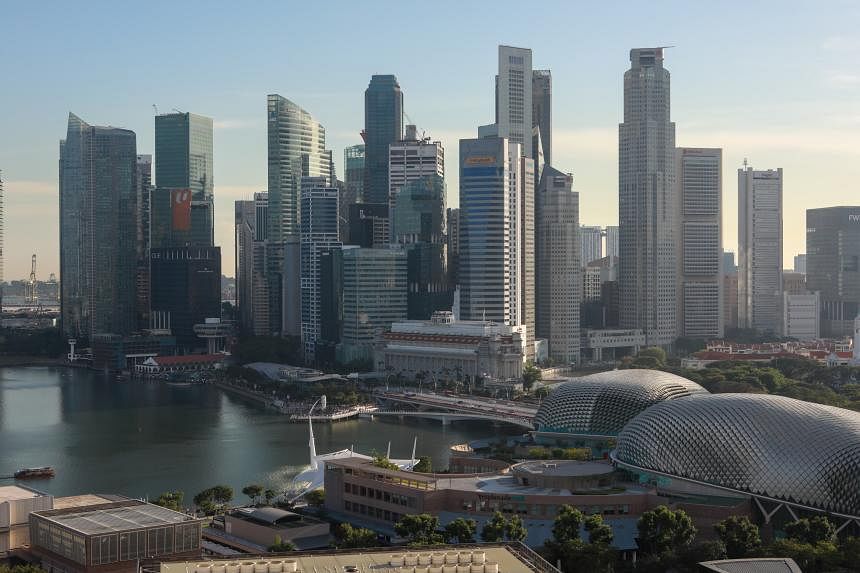SINGAPORE – A 26-year-old trade rule protecting cross-border digital services from Customs duties could expire in March if members of the World Trade Organisation (WTO) fail to renew it this week.
The stakes will be high for trade-dependent Singapore at the biannual Ministerial Conference, which is the WTO’s highest decision-making body.
Now in its 13th iteration, the conference is being held from Feb 26 to Feb 29 in Abu Dhabi, and brings together all 164 members of the WTO to formally discuss and decide on pressing trade issues.
Singapore, a strong supporter of the open, rules-based multilateral trading system under the WTO, will be represented at the conference by Minister for Trade and Industry Gan Kim Yong.
On the agenda is extending the digital trade rule, known as the Customs Moratorium on Electronic Transmissions, or the E-commerce Moratorium, which has come under rising threat since it was last renewed two years ago.
In the light of technological changes and rapid growth in digital trade, concerns are mounting among some member countries over the lack of clarity regarding the scope of the moratorium and the definition of “electronic transmission”, as well as the potential forgone Customs revenue, the WTO said.
Mr Gareth Tan, a representative of the Coalition for Digital Prosperity for Asia, noted that there is no accepted common definition of “electronic transmission”. “The term can be interpreted to include almost everything delivered electronically, whether it’s e-mails, or text messages, streaming content or video games.”
Countries with large, emerging economies, such as Indonesia, India and South Africa, are among those most likely to decide against extending the moratorium as they have expressed a desire to maintain policy space, said Mr Tan.
Policy space involves the flexibility to more rigidly control policy regarding data flows, access to data and the transit of digital goods and services. It can also include protectionist tariffs.
While it is “impossible” to define the impact of the removal of the moratorium, failure to extend it “will probably drive up the costs of digital services into and out of many markets, with large compliance costs landing especially heavily on smaller firms and consumers”, said Dr Deborah Elms, head of trade policy at the Hinrich Foundation, a philanthropic organisation in Singapore.
Mr Tan said: “From the consumer perspective, imagine paying more for a download stored in a data centre abroad because there’s a tax imposed on it.
“For businesses, access to vital software and digital tools might get significantly more expensive. All in, the removal of the moratorium could introduce a lot more friction to trade where there wasn’t any before, which is dangerous for a trade-dependent country like Singapore.”
E-commerce was first introduced at the second Ministerial Conference in May 1998, when WTO members agreed to a practice of not imposing Customs duties on electronic transmissions until the next conference. The moratorium has been renewed at every conference since.
However, as the sales of online books, music and software expanded, some governments grew increasingly concerned about the potential loss of tariff revenue that used to be collected for these offline categories, said Dr Elms.
“This worry was accelerated as cross-border services trade continued to expand and as some officials, especially in developing countries, were certain that the benefits of avoiding tariffs flowed only to big, foreign multinationals,” she said.
“Today, some governments are still convinced that the revenue that can be gained by applying tariffs will be substantial. It has led governments like Indonesia to open up tariff lines already, in anticipation of the end of the moratorium.”
Singapore stands to lose out if that happens, given the size of the local digital economy and its reliance on digital trade and connectivity.
Examples include the rise of platforms and apps with multiple integrated services – from transport to finance and telemedicine– which have changed how services are consumed. Businesses are also increasingly reliant on electronic transactions and digital solutions, from sourcing to invoicing and payments.
According to a report by the Infocomm Media Development Authority and published in October 2023, the Republic’s digital economy is significant and has experienced strong growth in recent years, contributing an estimated $106 billion, or 17.3 per cent of gross domestic product, in 2022, almost double of $58 billion, or 13 per cent of GDP, in 2017.
Singapore, over the past five years, has inked a handful of digital economy agreements (DEA) establishing digital trade rules and digital economy collaborations with other economies.
These treaties aim to develop interoperable standards and systems that support local businesses engaging in digital trade and e-commerce. They also support cross-border data flows and safeguard personal data and consumer rights.
The DEAs also encourage cooperation between Singapore’s economic partners in nascent areas such as digital identities, artificial intelligence and data innovation.
So far, Singapore has concluded four DEAs – with Chile and New Zealand, Australia, Britain and South Korea. Similar agreements with Asean, the European Free Trade Association and the European Union are in the works.
Some of Singapore’s existing free trade agreements, such as those with the United States, EU and India include commitments to not impose Customs duties on electronic transmissions.
A spokesperson for the Ministry of Trade and Industry said: “The extension of the e-commerce moratorium is a priority for Singapore at the upcoming WTO Ministerial Conference. It would provide businesses legal certainty, and especially benefit micro, small and medium enterprises, which rely on e-commerce to grow their business.
“It would also support WTO members’ efforts to embrace digital transformation and leverage opportunities in the digital economy. To this end, Singapore will be working with key partners to secure support for the extension of the moratorium.”
Singapore, together with Australia and Japan, also leads the WTO Joint Statement Initiative on E-Commerce (JSI). This is a grouping of 71 WTO members that have agreed to pursue negotiations on specific e-commerce proposals.
“The JSI is a primary vehicle for Singapore to pursue discussions on specific outcomes, including on the passage of a permanent moratorium, with other like-minded nations, to achieve a global baseline for digital trade standards,” Mr Tan said.
The JSI in December 2023 reached a substantial conclusion on a number of rules covering three broad areas of digital trade: trade facilitation, the open digital environment, and business and consumer trust. Its members are targeting conclusion this year.
Despite this, and given the diverging views of other JSI and WTO members, the risks for Singapore remain.
Said Dr Elms: “If the WTO moratorium falls, Singapore has already pledged not to collect duties on electronic transmissions in a range of free trade and digital agreements. However, others in the JSI can impose tariffs even if they have commitments in free trade agreements.”
She added that it is not guaranteed that those in the JSI will not impose tariffs, regardless of what the wider membership opts to do.
While business groups globally, including those in the US, India and Indonesia, have lobbied against the imposition of Customs duties on electronic transmissions, Dr Elms warned: “Even if the moratorium is extended again, it will apply just until the next Ministerial Conference in two years. Then, the battle will need to be fought all over again.”


